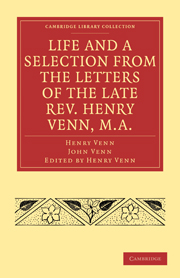Book contents
- Frontmatter
- ADVERTISEMENT
- PREFACE BY THE EDITOR
- Contents
- MEMOIR BY THE REV. JOHN VENN
- CORRESPONDENCE
- SECTION I LETTERS WRITTEN FROM HIS FIRST APPOINTMENT TO HUDDERSFIELD, TILL HIS REMOVAL FROM IT
- SECTION II LETTERS WRITTEN FROM HIS ACCEPTANCE OF YELLING, TO THE COMMENCEMENT OF HIS CORRESPONDENCE WITH HIS SON
- SECTION III LETTERS WRITTEN TO HIS CHILDREN AND DIFFERENT FRIENDS, FROM THE YEAR 1777 TO THE TIME OF HIS SON'S ORDINATION
- SECTION IV LETTERS WRITTEN FROM THE TIME OF HIS SON'S ORDINATION, TO THE YEAR 1788
- SECTION V LETTERS WRITTEN FROM THE YEAR 1788, TO THE CLOSE OF HIS CORRESPONDENCE
SECTION IV - LETTERS WRITTEN FROM THE TIME OF HIS SON'S ORDINATION, TO THE YEAR 1788
Published online by Cambridge University Press: 05 August 2011
- Frontmatter
- ADVERTISEMENT
- PREFACE BY THE EDITOR
- Contents
- MEMOIR BY THE REV. JOHN VENN
- CORRESPONDENCE
- SECTION I LETTERS WRITTEN FROM HIS FIRST APPOINTMENT TO HUDDERSFIELD, TILL HIS REMOVAL FROM IT
- SECTION II LETTERS WRITTEN FROM HIS ACCEPTANCE OF YELLING, TO THE COMMENCEMENT OF HIS CORRESPONDENCE WITH HIS SON
- SECTION III LETTERS WRITTEN TO HIS CHILDREN AND DIFFERENT FRIENDS, FROM THE YEAR 1777 TO THE TIME OF HIS SON'S ORDINATION
- SECTION IV LETTERS WRITTEN FROM THE TIME OF HIS SON'S ORDINATION, TO THE YEAR 1788
- SECTION V LETTERS WRITTEN FROM THE YEAR 1788, TO THE CLOSE OF HIS CORRESPONDENCE
Summary
On the 22d of September 1782, Mr. John Venn was ordained Deacon, by the Bishop of Lincoln, on the title of his father's curacy.
To this event the father had been looking forward, for many years, with ardent hope, and ceaseless prayer. But the son, during the same interval, was frequently suffering distress, under a deep sense of his own unworthiness for the sacred office; and had at one time even abandoned the thought of undertaking it. It is no uncommon circumstance for young men of religious sensibility to suffer in the same manner. They, more particularly, who have been habituated to the contemplation of a high standard of ministerial excellence, are apt to despair at the contrast suggested by their own inferior pretensions. Yet that very humility, which at first oppresses them with fear, may be the germ of future eminence in piety and usefulness. The case before us was an instance of this. Many of my readers may therefore be interested, and some may be comforted, by the introduction of a letter written by Mr. John Venn to his father two years before he was of age to take orders, in which the misgivings of a tender conscience and self-diffident spirit are affectingly exhibited. The letter was sent to Mr. Venn whilst he was paying the visit to Huddersfield which has been already mentioned. The father's answer is also added.
FROM MR. JOHN VENN.
Yelling, 18th Oct. 1780.
MY VERY DEAR FATHER,
The natural reservedness of my temper, and the fear I had of giving you pain in your bad state of health, prevented me from opening my whole mind to you at Yelling; especially as…
- Type
- Chapter
- Information
- Publisher: Cambridge University PressPrint publication year: 2010First published in: 1834



